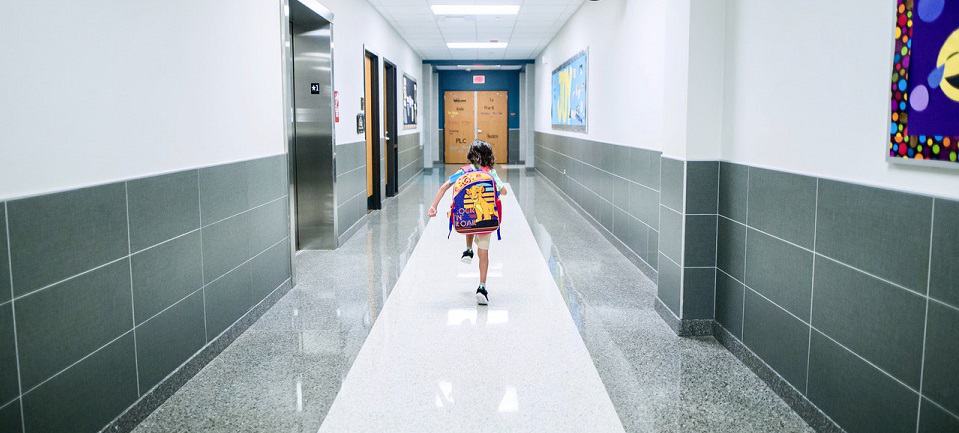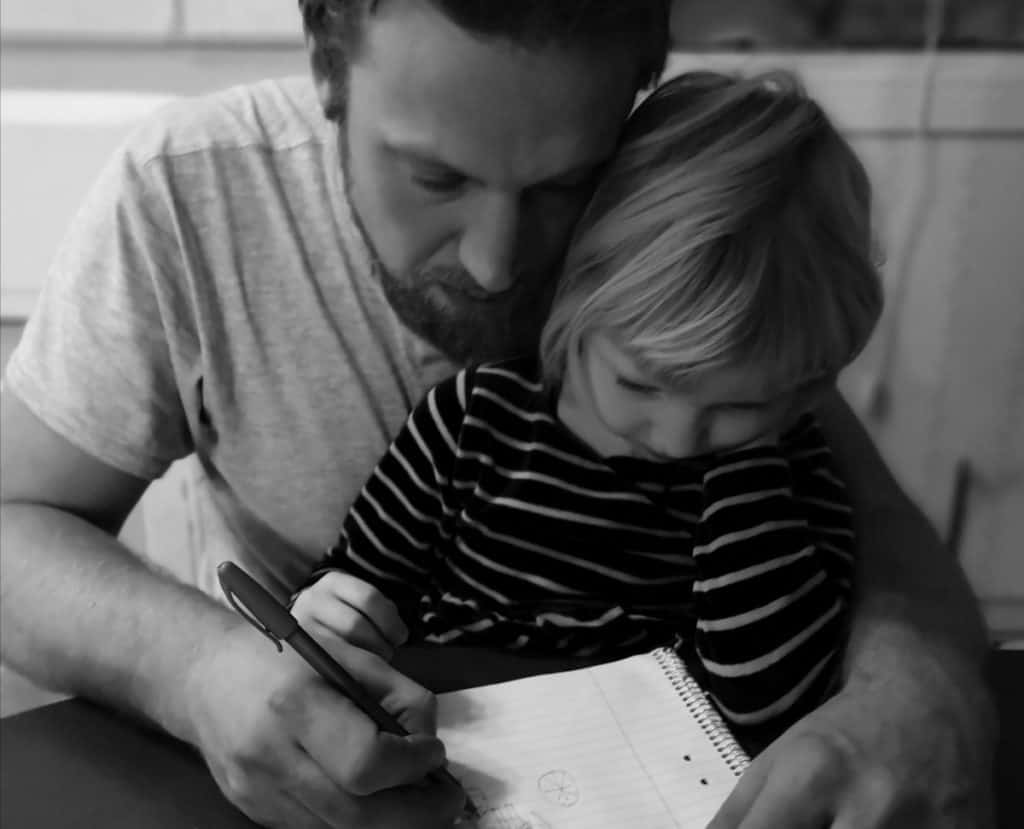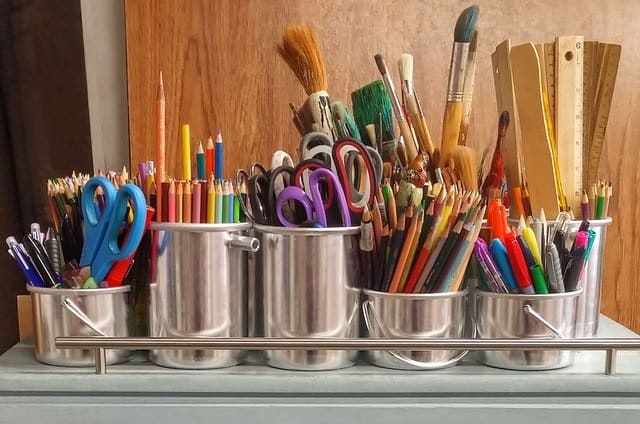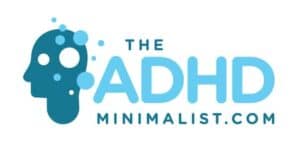
What if the problem of the ADHD child in the classroom could be fixed by simply building positive teacher-child relationships with your most frustrating students?
What if a teacher could carve out a few minutes of focused positive attention per day for the ADHD child?
Gabor Maté M.D. believes that building relationships is the key to calming the anxiety that keeps ADHD/ADD children from focusing.
In this article, I would like to discuss some ideas that Dr. Gabor Maté mentions in his book. for helping children with ADHD/ADD in the classroom.
If you do not want to read about my personal school story skip down to the next main heading.

While reading his book Scattered minds for the seventh time I was struck by how most of the symptoms he describes for ADHD seemed to describe me.
I originally picked up his book to help my struggling children, but it wouldn’t surprise me if some of their problems stem from problems of my own.
My children have had some amazing teachers over the years and some who were less understanding.
As I write this article, I’m forced into the teaching position by the Coronavirus.
Not because my children’s school is closed but because they have sore throats and can not return to school until they are completely well.
Although I grew up in the USA, I now live in Sweden, where homeschooling is only allowed under special circumstances.
With the exception of my son’s english homework, I find helping my children to be rather difficult. Somehow doing homework brings out the worst in all of us.
I have a wonderful husband, David, and three beautiful kids My son Lage (13), my daughter Maria (10), and my youngest Frida (5)
The fact that Swedish is not my native language and that schools no longer teach math problems the way I learned to do them complicates helping my children with homework.
My oldest two children have been diagnosed with ADHD/ADD and dyslexia doesn’t make things any easier.
My new experience as a ‘Homeschool Mom’ makes me even more appreciative of what my children’s teachers do for them every day at school.
I know that students vastly outnumber teachers, and they often lack the proper resources and teachers’ aids. They are overworked, underpaid, and stressed.
Despite these stresses I am hoping that teachers will consider one more thing. The importance of building relationships with problem students.
‘’Neuroscience has established that the human brain is not programmed by biological heredity alone, that it’s circuits are shaped by what happens after the infant enters the world and even while it is in the uterus.
The emotional states of the parents and how they live their lives have a major impact on the formation of their children’s brains.
Though parents can often not know or control such subtle unconscious influences.
The good news is that major changes in the circuits of the brain can occur in the child and even in the adult if the conditions necessary for positive development are created.’’
A quote from Scattered minds by Gabor Maté M.D.

The story of my school years
I can not help but be transported back in time as I think about ADHD, dyslexia and school. Right from the start I found school rather difficult.
I went to public kindergarten which I found stimulating and fun at first, but I soon found out how cruel other children could be.
Three of the girls I played with most decided, out of the blue, that they did not want to be friends with me anymore.
On the way back from the school Library they said, ‘Don’t take this personally, but we have decided not to be friends with you anymore.’
How could I not take that personally? I quickly walked away from them. Holding my newly borrowed book open, I pretended to read in order to cover my tears.
It never occured to me that I should tell my parents or my teacher about this incident.
I think my teacher must have had her hands full with my kindergarten class because I have no memory of any positive contact with her.
In fact, I cannot even remember her name or what she looked like.
Needless to say, I did not complain when mom suggested my brother and I be homeschooled over the next few years while we traveled with my father’s construction company.
I have fond memories of these trips, and I felt especially close to my family during this time.

When my father switched jobs and began teaching at a local school, my parents naturally registered my brother and me to attend there.
I enjoyed the socialness of school after being homeschooled for three years, but I had trouble keeping up with the schoolwork.
My first year was in fourth grade, and my class was given an excessive amount of homework by a strict young teacher fresh out of college.
I remember staying up till ten at night trying to get all my homework done! Even with all my effort, I got Cs and Ds on many assignments!
Teachers, I believe, often do not realize the consequences of their actions.
In their efforts to make their work efficient, they do not realize they humiliate their students.
My worst nightmare was having to switch papers with the person next to me and correct each other’s assignments as the teacher read the answers aloud.
Often I got grades I was ashamed of, and I didn’t want my schoolmates to know how poorly I did. Such teaching methods made it impossible for me to hide my grades.
If I had been doing poorly because I simply did not care, I might not have cared what my classmates thought, but that was not the case.
I was trying extremely hard to get good grades, as well as trying to figure out what was expected of me socially after several years of absence from a normal school.
My brain was working overtime!

I was equally embarrassed when we had a fixed amount of time to silently read a text during class.
Those who finished early got to go to the teacher’s desk and do fun things while a couple of us slow readers repeatedly finished last and missed out on the fun!
I hated finishing last, but try as I might, I could not read and comprehend the text faster.
The idea of cheating to save me humiliation had not yet entered my mind.
That year my parents had me screened for dyslexia, among other eye problems.
They found that I had trouble with eye tracking, and I did special exercises every week for six months. That helped my reading greatly.
Those in charge of the screening tried to dismiss my dyslexia, saying it wasn’t that bad and that I could still grow out of it, but I am in my 30s, and I still can’t spell to save my life!
If it were not for spell check, this blog would not be readable! Amazingly, I actually learned to enjoy reading, although I still consider myself a slow reader.

By the end of fourth grade, I was beginning to wonder if the social benefits of school could outweigh the negative aspect of homework.
If the fifth grade hadn’t been easier, I think I may have begged my mom to continue homeschooling me.
I found it extremely hard to pay attention during classes I found uninteresting in junior high.
Classes I liked I did rather well in without much effort, probably because I listened and remembered what went on in class.
In boring classes, I would destroy my fingernails and cuticles in an attempt to keep my fidgetiness under control, biting and picking at them during class.
That resulted in several cases of staph infection under my fingernails!
Under strict orders from my parents to leave my nails alone! I tried fiddling with pens and erasers, doodling, and swinging my legs around as discreetly as I could under my desk to keep myself still.
Watching a movie one day, an idea struck me. If the office worker in the movie could stay calm by squishing a stress relief ball, why couldn’t I use one to stay calm and focused in class?
I rummaged through our party supplies, looking for a balloon. Some flour from the pantry and a tupperware funnel completed my list of supplies. Soon I had my own de-stress ball!
I snuck it into school and successfully stayed calm and attentive for several weeks.
Unfortunately, I had not considered that all the squishing was weakening the balloon.
One day mid lecture, it exploded! Flour flew everywhere, covering me and fanning out to create a whilte cloud around my desk. My classmates thought this was hilarious!
My poor mother, who was substitute teaching, was probably extremely embarrassed! She didn’t know what to do with me but finally wrote my name on the board.
It was standard practice in the USA when I was in grade school for teachers to write the names of students who were not paying attention or following the rules on the chalkboard.
Getting your name on the board three times in one day resulted in missing fifteen minutes of play at recess.
I understood why I got my name on the board, and I knew that creating a cloud of flour in English Class was not ok.
What frustrated me was my inability to explain why I had done what I did to family and friends.
I never seemed to find the words to explain that my balloon de-stress ball helped me concentrate before it unfortunately exploded!
Although I often talked incessantly, I often found it difficult to explain how I felt or find the words to explain what was most important to me. I felt chronically misunderstood!

Math class was never interesting for me.
I was not naturally good at math, and my mind would wander during lectures.
If we had time to work on our assignments at the end of class, I rarely knew what I was supposed to do with the numbers on the paper in front of me!
I always hoped the teacher would leave the classroom so I could ask a friend to explain.
I often copied the behaviors of those around me and pretended to follow along in my book or doodled when my friends wrote down the answers.
Fortunately, my teacher never seemed to notice my lack of attention.
Sometimes I was asked a question now and again, which I didn’t know the answer to, but that was never a great catastrophe.
After several months of not paying attention, I figured I would give listening a try. It might shorten my study time at home, I reasoned.
I entered Math class that day determined to pay attention at all costs!
I observed what the teacher wrote on the chalkboard. I paid careful attention to what she said, my eyes never leaving her as she walked around in front of the class.
There I sat halfway through the lecture feeling rather proud of myself that I was actually following along.
”I just might understand the assignment today,” I thought when my teacher suddenly stopped pacing and looked right at me.
‘’Why are you not following along in your book, Annie?’’ She bellowed in front of the whole class! ‘’Stop staring off into space and pay attention!’’
I must have had a shocked expression on my face as I opened my mouth to explain that I had been paying attention, but I shut my mouth just as quickly.
A part of me sensed that I wouldn’t be understood no matter what I said.
I felt a bit embarrassed, but a silent rage overwhelmed my senses! If she wanted me to look at my book, I would look at my book! But, She could not make me pay attention!!!
I decided that I would no longer pay attention in her class in my rage! I would do the exact opposite of what she wanted!
I never felt that this particular teacher liked me.
She was stern and strict and rarely smiled at the class.
I was not good at any of her subjects, and we got off on the wrong foot! My relationship with that particular teacher seemed doomed.
What my teacher failed to take into account was that I was dyslexic. Shaming me for not reading along in my test book while she read aloud to the class was not called for.
I was an incredibly slow reader, and I learned best by listening. If she had just gotten to know me a bit, the whole scene might never have happened.
Fortunately, my dad was a high school math teacher, and he never ran out of patience with me.
What I didn’t learn in my math class, for trying to spite my teacher, I would ask my dad to explain at home.

”It’s sad how many times in life, we attempt to get back at others, and only end up hurting ourselves. If only we could go back and tell our young selves to forgive and forget.” Annie
I have my father to thank for my average high school math grade of A-. Although I did not care much for math, I cared about getting into college.
I continued to do well in classes I was interested in and not as well in classes that did not spark my interest throughout high school!
I suppose I have the American college system to thank for giving me an external motivator for keeping my grades up when I had no internal motivation.
The classes I did best in were classes where the teacher liked me. Feeling a connection to my teacher motivated me to try extra hard!
I liked my english teacher although I felt horribly lost in her english classes. I lived for the days when we had literature and she spent most of the class period reading aloud.
We often had spelling or vocabulary quizzes in her class.
Because I am dyslexic, I could never remember how to spell the words. I quickly noticed that studying spelling the night before was futile.
I resorted to studying during the break between classes, breaking up the words and making up associations.
My goal was to remember them long enough to make a decent grade on the quiz.
I knew this was a short-term solution to a long-term problem, but no one realized how bad my dyslexia actually was, and I had no idea how to help myself long-term.
I continually mixed up words like angel and angle, and sweet and sweat!
A friend of mine who was proofing a short story for me gaged when she read that the main character received a sweat kiss!
To this day I cannot remember how to spell certain words. Often I ask my Swedish husband how to spell, and he knows the English spelling when I do not!

Teachers try putting yourself in an ADHD child’s shoes
‘’A doctor in Ontario gave the father of a nine year old girl with ADD a dramatically apt analogy.
‘Imagine’ He said, ‘Your standing in the middle of a really crowded room.
Everyone around you is talking. Suddenly someone asks you, ‘What did, so and so, just say?’’
That’s what it’s like Inside the ADD Brain.’’ Scattered Minds by Gabor Mate M.D.
I often found my mind wandering in class, and if a teacher asked me a question, I felt just like the girl in the crowded room wondering what did the teacher just say?
To understand kids who talk all the time, As I did, imagine having so many ideas in your head, at the same time, that you are afraid of forgetting them!
Because you can not write efficiently, you must say everything that pops into your head immediately! Talking is your way of helping your brain remember.
If Anne of Green Gables had been born in modern society, I believe she would have been diagnosed with ADHD.

Do not blame the parents of ADHD children. Work with them instead
In his book Scattered Minds Gabor, Mate M.D.’s description of how parents of ADHD children feel hit home with me.
‘’Your stuck in the middle of heavy traffic at an intersection. The engine has stalled and you are trying your best to get moving, everyone is yelling and honking angrily at you, but no one offered to help, perhaps no one knows how to.’’
As the Mother of ADHD children, I know how it feels to get calls from teachers several times a week about how my child was disturbing other students, hitting, or that he was not able to do his school work.
We have been on both sides of the pendulum as our children’s worst behavior swings back and forth between school and home.
Some years my children tried their utmost at school and came home exhausted, falling apart completely as they walked through the front door.
Afternoons and evenings were a nightmare, and getting homework done was out of the question.
Other years my children were little terrors at school and little angels at home. We spent many evenings driving our kids to friends and classmates to whom they needed to apologize.
Fortunately, most of my kid’s teachers were wonderful people who were willing to work with our family.
Most parents of ADHD children are already stressed out and unsure what the best way of handling their child is.
Don’t put all the blame on them for being ‘BAD Parents’ they are doing the best they know how.
Instead, try strategizing with them on ideas that could help both home and school. Suggest they read Dr. Gabor’s book.
When I read his book, our son was extremely clingy and needy. He refused to leave my husband and me except for during school! We felt smothered!
The book helped me understand that our son felt disconnected from us, and he was trying to make up for his disconnection by always placing himself in our immediate presence.
We tried Dr. Gabor Mate’s remedy for this, which was more engagement with our son.
We were to invite him to do things with us on our initiative.
When children suspect that the only reason their parents spend time with them is because they whine and insist on it, then the time you spend together does not help to alleviate the child’s deepest questions.
Deep down, children wonder if they are wanted, they are not sure if their parents secretly wish for someone else.
We embarked on a campaign to take him out every week for six months. This actually worked! The worst of his clingy behaviour subsided.
We still try to take opportunities to spend time with him on our initiative, but it’s not every week.
This approach also alleviated some of his stress at school because he was no longer so scared to be away from us. He could settle down and do his work at school.
This strategy was not something I would have come up with on my own. I was longing for distance from my son’s disturbing behavior, not more time together.

Teachers do no harm
‘’Teachers sometimes forget their immense power to wound.
How deep classroom inflicted emotional hurts can go, how long lasting their sting potentially is, may be gleaned, from the history ADHD Adults give of their school years.
Many still cringe as they recall humiliations, the cutting and sarcastic remarks of their teachers, the punishments for misbehaviour they did not deliberately initiate, and for inabilities they did not know how to overcome.’’
Dr. Gabor Maté from his book Scattered Minds
There are many stories like my story of being humiliated by my math teacher, and there are many teachers who will never know or remember the pain they caused, there are many students who will never forget.
‘’Teachers need to remember that the ADD Child by definition has suffered the pain of feeling cut off from emotionally significant adults, has a profound sense of shame, and has underneath whatever defiant behaviour weak and precarious self esteem.
Moreover odds are he also suffers from some degree of social rejection. Shaming these children for their mistakes, inattention, slowness at grasping instructions, and sloppy handwriting only reinforces their negative self image and undermines their emotional and intellectual growth.’’
Scattered Minds by Gabor Mate M.D.
(Dr. Gabor Mate uses the term ADD for both ADHD and ADD in his book scattered minds)
‘’The class will now wait until Karin returns to earth! Is a relatively mild comment a grade 3 teacher made about an inattentive ADD child in my practice.’
Dr Gabor Mate writes. ‘’The child came home that night sobbing helplessly. Mrs. N hates me! All the kids laughed at me!
Painful for any child an experience of that sort is devastating for the sensitive and insecure ADD child.’’

Staying calm in the classroom
Kids with ADHD often need something like my stress ball, a squishy or silly puddy to fiddle with, in order to sit still in class.
I often wished I had a special chair that moved a bit. I thought this might help my fidgetiness or perhaps a cushion to sit on filled with air or water so I would sit a bit unstable.
These were wishes that I couldn’t verbalize until I was 24 and sitting in a class in Sweden.
Other desires, like my wish to walk in the back of the classroom while I read my assignments, though I found the words to express them, I never had the courage to ask my teacher.
Who knows, maybe if I had spoken up, my wish would have been granted.

Don’t forget about the attachment needs of your troubled students!
If you can cultivate a warm relationship with your students, you will reap the rewards in the months that follow.
Take a little extra time to smile at your especially hard students, Spend some time at their desk making sure they understand instructions and maintaining warm positive contact.
Knowing that the teacher actually likes you and believes in you can make a huge difference on the motivation of the child to do well.
Building up the child and encouraging him/her may be the goal in itself for the first few months of the school year.
No, we do not want to see the child fail their class, but if the child is stressed about relationships at home, feels that their teacher does not like them, is behind on schoolwork, and other children make fun of them then the combination of all these stresses is like a roadblock in the child’s brain which keeps them from learning.
Try to create a safe environment at school so the child can relax and learn.
School’s goal should be to produce functioning adults who can contribute to society, not just measure how well children can do on their schoolwork.

Teachers can often recognize the problems of ADHD/ADD before the parents do.
My daughter’s teacher noticed she was having trouble in the classroom before I even considered the possibility that she had ADD.
Because she wasn’t hyper and disruptive she sat in the back of the classroom not understanding the instructions for her assignments.
Children who don’t pay attention are often quick to pretend they know what they are doing. Fortunately my daughter’s teacher was quick to see the problem.
Teachers should take the time to ponder if they have a pattern of negative responses to a particular student. If so they may consider if the child has ADHD.
‘’Who we are trying to teach must precede what we are trying to teach as a fundamental consideration.
Teaching methods must reflect the first of those questions at least as much as the second.
If the student population is to include a sizable number of ADD children, as is increasingly becoming the case throughout North America, creative minds working in education need to apply themselves to quit trying to fit the students into the schools, but to fashion the schools around the needs of the children.’’
Dr. Gabor Maté in his book Scattered Minds
It would be most helpful if all teachers would educate themselves enough to be able to recognize ADHD/ADD in their students.

Those with ADHD need extra time on tests
I never liked tests. I could have studied for hours the day before, but I would become so stressed during the test that I often forget things I knew.
I hated always being one of the last kids to finnish my test. How friends of mine could finish so quickly was always a mystery to me.
State tests were even worse than normal school tests. When taking the ACT test I was always more nervous than normal.
Its formality and strict time limits made me want to escape and daydream. At times when I should hurry up, I felt myself slow down. Why hurry to finish when I knew I would never get done on time?
Sure enough I almost always filled in the last few questions with a desperate guess as the remaining seconds ticked off the clock.
I took the ACT twice. I figured if I retook it, I would be less nervous the second time. This was not so.
I was just as nervous the second time and much more distracted. It just so happens that the boy sitting in front of me had not turned off an alarm on his watch.
It started peeping faster and faster louder and louder in the middle of the test! If the noise was not distraction enough he started fumbling and fiddling with his watch trying to turn it off with no success!
You could hear the boy becoming more and more stressed as he realized something was wrong with his watch and it would not turn off!
The man in charge of administering the test finally clomped down the aisle and took the watch off the boys wrist.
Returning to his desk he wrapped it in kleenex and thrust it in his metal desk drawer with an echoing bang! There it continued to make muffled peeps for the duration of our test! After that experience, I decided not to torture myself any further by taking the test again!
Even when I was grown and taking classes in Sweden I would get so nervous when it was test time that it took me forever to finish!
Giving students who need extra time the opportunity to finish their tests later may take the pressure off so they can actually do their best work.
This seems to be a problem of Explicit and Implicit memory. Explicit memory refers to memories that you can recall on demand. Like your favorite memory of your grandmother or the answers to a test.
Implicit memory is the part of your memory that helps you function without being conscious of it, Like remembering how to stay balanced on a bike or remembering fear responses to negative experiences that occurred before you had any explicit memories.
If you have ever been extremely upset only to be embarrassed by your own overreaction, when you calmed down. You have experienced the recall of implicit memory.
Donald Hebb a neuropsychologist known for his work in associative learning, first coined the phrase ‘’Neurons that fire together wire together.’’
This explains why you overreact when subjected to the same stimuli that first caused your child’s brain to wire a fear response to a particular experience.
It also explains why many with ADHD have an automatic stress/panic response to taking tests.
Unfortunately, it is much harder to rewire the neurons once fired together, but it is far from impossible.
‘’While explicit memories are being retrieved, when we recall something, there appears to be increased blood flow to the frontal lobe of the brain.
Radioactive brain scans by contrast have shown in some ADD brains slowed frontal Lobe activity and diminished blood flow to this part of the cortex during stressful mental effort.
What we may be seeing here are implicit memory circuits imprinted with fear overwhelming explicit memory.’’
Dr. Gabor Maté in his book Scattered Minds

ADHD children need to be allowed to play and express themselves creatively in school.
Despite trends to cut down on or eliminate play from schools altogether, play has never been more important.
This is especially important when the number of children diagnosed with ADHD is on the rise.
The creative subjects and recess times, break up the day and give the brain a break.
This allows the brain to focus better when they need to concentrate on Math and English which are hopefully conveniently sandwiched in between the fun.
In order to integrate more ADHD children in the classroom schools may need to rethink their style of teaching and try to incorporate more creativity into math and english lessons.

Schools, ADHD, and medications
We have tried a wide range of approaches to my son’s ADHD. When he was first diagnosed we didn’t want to medicate him immediately.
We first tried a supplement called protandim which worked for a time before he was given more difficult schoolwork on a regular basis. He still takes protandim periodically together with his ADHD meds.
We even tried following diets for ADHD.
The schools worked with us to cut out sugar, white flour, and milk from our children’s food, but the negative effects on our kids from being stressed about what they were allowed and not allowed to eat at school outweighed the positive effects of a better diet.
We finally went back to the regular school meal plan.
My children’s school has a salad bar and kids are encouraged to eat salad before taking other food.
I do not feel that the average swedish dish served in schools is causing a major problem, but if you have very poor food at your school the diet of ADHD children may need to be looked at.
We then embarked on the confusing world of medications for ADHD. We have now tried four different meds between my son and daughter.
My daughter who has ADD was prescribed Metylfenidat Actavis, a drug which worked for her on the first try. We have adjusted the dose over the years.
Our son has bounced around between several medications and dosages.
Some of which helped tremendously at school, but left his body at 14:00.
He would arrive at home and immediately freak out causing a range of problems in the family for the next three hours!
When we finally told the school that we needed to change his medication, because it was wreaking havoc on our home life, they were not very understanding.
Things were going very well at school and they never saw the horrible flip side of that particular medication.
Listen to the parents. They want their children to do as well in school as the child’s teacher does, but you can not sacrifice your family life at home for the sake of doing well in school.
I hope it is unnecessary for me to point this out, but schools should not require parents to medicate their children as a prerequisite for attending.

ADHD and hair analysis.
I bring this up because it had a profound effect on me.
Teachers could suggest Hair Analysis to parents of children who don’t want to use medication. Sometimes parents do not even know that this is an option.
After my son was born I started feeling a bit depressed and really irritable. When I finished nursing I just didn’t feel like myself.
I sent in a hair analysis on my husband’s sister’s suggestion. Some weeks later I received a big manila envelope full of papers.
The chart showed that I was low on vitamin B among other things.
Certain foods were recommended that contain these vitamins, and I needed to take supplements for three months. I followed their strategy, and after three months, I felt much better.
Not only did I feel less irritated and more like myself prior to pregnancy, but I also found that I was able to sit down and watch a without knitting, playing with my fingers, biting my nails, or just getting up and doing something else.
I could be calmer and pay more attention to the task at hand.
A few years later a thought struck me. If my son had been given all my vitamin B (which was probably low before pregnancy) at some point the B must have run out.
He, I reasoned, must also be deficient in B vitamins because I could not possibly give him enough when I was lacking myself.
I did a hair analysis on my son and sure enough he was low on vitamin B!
I present this information on a take it or leave it basis. I am not a doctor or an expert on alternative medicine. I am well aware that not everyone believes in alternative types of medicine, and I just know the positive effects it had on me.

Adjusting the homework load.
Some psychologists in Sweden suggest that children with ADHD or ADD should not be given homework to take home.
The school should provide a study hour and a competent teachers aid to help a small group of children get their homework done at school.
We had to insist that my daughter’s teachers help her get her homework done at school during a couple very difficult years.
During this time our son hit puberty and the clash between hormones and ADHD wreaked havoc on our home.
Often the school had to take care of his homework as well.
He would come home at 14:00 and completely fall apart. We were dealing with so many behavioral, and psychological issues at this time, that homework was simply out of the question.
Now that things have calmed down with my oldest we are again trying to help our daughter with her homework.
The school has adjusted the homework load for her, as well as for several other students who need extra help.
They divided the class into two homework groups.
One group is for kids who can do the normal homework for any particular grade level, and the other group is for kids who need easier assignments.
It may be that some classes need a third group for students who need more advanced homework.
My daughter is learning more now that the homework is on her level. Trying to do homework that she did not understand or was far above her skill level only resulted in her panicking every time we mentioned homework.
After they adjusted the homework load to her level homework was much easier to accomplish at home.

Parents of ADHD children should not always have to keep it together!
If the school could initiate a group for parents or even just the mothers (who often carry the larger burden of caring for their troubled children) of ADHD, ADD, dyslexic, and autistic children who could meet and share tips and ideas for how to help their children as well as the mothers hurts and fears,
this could alleviate some of the psychological stress and isolation that mothers of troubled children often feel.
I know that at times when trying to deal with my son’s extreme psychological ups and downs, I have almost been pushed over the edge myself.
Parents who deal with children who
- Hit parents and siblings
- Children who talk about committing sucide
- Children who hurt themselves on purpose
- Depressed children
- Children who try to run away or hide from the parents
- Children who talk incessantly and refuse to allow others to get a word in edgewise
- Children who demand their parent’s full attention at the expense of their siblings
- Children who have panic attacks
- Anxious children
Parents already stressed to the max will probably not respond well when you press them to get their child’s homework done!
Homework is the last thing on their minds. I should know because the above list are all things that we have dealt with in our home.
Work with the parents and try not to add further tension to their home.

When students do not want to be seen as ‘different’
My son often resisted using tools that the school provided for him which were intended to help him manage the same schoolwork as his peers.
Kids with ADHD often have sloppy handwriting due to problems with fine motor skills. To help my son overcome this the school gave him a computer in the 5th grade.
When the other kids were asked to handwrite a paper, he was expected to get out his computer and start typing.
He often resisted using the computer and handed in almost completely illegible papers because he didn’t want to be different.
The process of getting my son diagnosed was delayed because the psychologist assessing him became critically ill.
The entire assessment fell through the cracks. Two years went by before he got an actual diagnosis. He started getting help in school late.
My daughter, who was later diagnosed with ADD, was quickly assessed by her teacher as having ADD or something similar.
While this did not suffice as a medical diagnosis the school decided to treat her as if she had ADD and began helping her immediately.
She does not resist using tools that have been given to her to make school easier. Perhaps this is because she started using them at such an early age that it became natural for her.
When she began to enter the phase of caring excessively what her peers thought of her, she couldn’t imagine getting her work done with her special ‘tools’.
Sometimes catching the signs of ADHD early makes a world of difference in how the children do in school.

Most ADHD/ADD children will settle down if they can work one on one with a trusted adult.
I notice this with my own children who often need me to sit beside them in order for them to concentrate on their homework.
Dr. Gabor Mate believes that employing extra school personnel to work one on one with troubled students while they are young, could save the schools money in the long run.
If children who cause trouble in the classroom could bond with an adult who can help them learn, they could be slowly integrated into the classroom over time.
I can’t think of school and ADHD without remembering a boy in my fourth grade class.
I have no idea if he actually had a diagnosis, but his extreme behaviour continually disrupted our lectures.
Whenever the teacher needed to step out of the room, he would leap to his feet and begin hitting other students, fiddling with other’s things, and running around the room. My most vivid memory is when he repeatedly tried to put a chair on a girl’s head!
The solution the school came up with was to put his desk in a giant water heater box at the back of the classroom.
There he sat supposedly working on homework by himself. I honestly wondered if he learned anything that year.
I guess his home had more troubles than most.
If only the school had had extra funds for a teacher’s aid to spend some quality time with him it may have changed not only his ability to learn but also his life.
‘’The teacher who can maintain warm nonthreatening contact with the ADD child will be rewarded with less disruption and longer attention spans. Except in the most severely affected cases.
Just as at home the relationship with the child not any cognitive goals has to be kept foremost out of necessity.
The teachers ability to provide for any one child’s attachment needs is going to be limited.
No teacher will ‘Cure’ a child of ADD, but each teacher properly informed and motivated can make a tremendous difference in easing the path in school for any ADD child just by paying attention to the relationship.
Difficult as it is for the overworked teacher in the hubbub of the busy classroom, reaching out to the child each day even for a brief moment will go further than any number of sternly delivered instructions.’’
Dr. Gabor Maté from his book Scattered Minds
Many of these tips come from Dr. Gabor Mate’s book Scattered Minds. Although some of them are purely from my own experience.
Gabor Mate is a doctor who has ADHD himself, has raised 3 kids all diagnosed with ADHD, as well as working with hundreds of children and adults diagnosed in his practice. He has a slightly different and much more hopeful view of ADHD than most other authors on the subject.
If I could I would make the book scattered minds mandatory reading for all teachers. It’s full of interesting stories and It will most certainly open your eyes and give you a new understanding of your students.
Gabor Mate suggests that teachers read the novel in a glasshouse. I have not read this book myself.

To read about ADHD medications and school click here. https://theadhdminimalist.com/how-three-different-adhd-medications-affected-my-son/
To read about Limbic bonding (Something that made a huge difference for my son) Click here. https://theadhdminimalist.com/how-limbic-bonding-transforms-adhd-children/
Limbic Bonding can work for teachers and parents if you are willing to put in the time to change a child’s life.
For more information and reading tips check out Our Favourite Resources page. https://theadhdminimalist.com/our-favourite-resources/
If you have questions or comments please send me an email at annie@theadhdminimalist.com
Copyright Annie Eklöv


